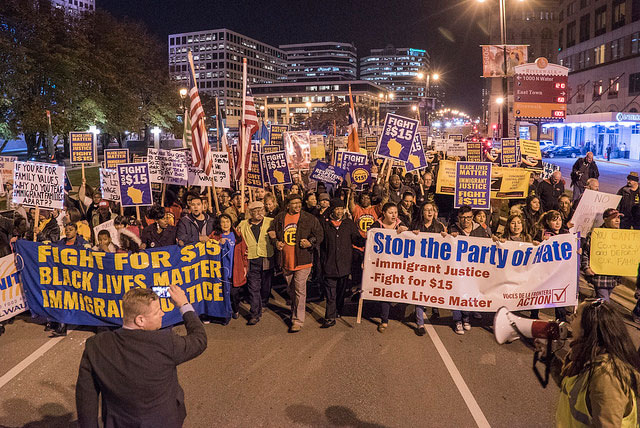
Honest, paywall-free news is rare. Please support our boldly independent journalism with a donation of any size.
The Atlantic’s Eric Liu asked what it would take to move presidential candidate Bernie Sanders’s ambitious proposals from “we’re gonna” to “we’ve done it,” outlining seven steps to bridge the gap. First among Liu’s recommendations is a call for a “Bernie’s 30” of progressive congressional Democrats to oust Republican incumbents, throwing the weight of the Sanders campaign’s small donor base into strategic races around the country. But what about Bernie’s three million?
Liu’s suggestions are solid, involving a mix of plans for grassroots mobilization and innovative electoral strategies at all levels of government. According to his fifth point, “Sanders would have to link up to other organic movements that are arising in parallel with his own campaign.” Liu cited Democracy Awakening and even Trump supporters hungry to “make America great again.”
But the strategies for the Sanders camp’s success and that of egalitarian movements are necessarily distinct: Bernie is a candidate for, not of, the movements, but his success thus far is a sign of what a sizeable chunk of America is ready for, electorally speaking: democratic socialism. It’s still hard to escape the feeling that he caught today’s movements off guard. If Sanders is elected, will movements make their own push for electoral power, for a party of and by DREAMers, the movement for black lives and the emergent youth climate fight? Or will they mobilize outside to hold him accountable? Hopefully, both.
Bernie and the soul of the Democratic Party are worth fighting for. As renowned civil rights organizer Bayard Rustin said, “A political party is not only the product of social relations, but an instrument of change as well.” A Sanders administration would make life better for millions of ordinary Americans and likely signal the end of the Clintonite New Democrats’ rush for the center. Radicals can win – or at least get close enough to shake up the party establishment, as Sanders already has. Movement leaders could be the “Bernie 30,” and push for a historic realignment with their own agenda, shared platforms and party infrastructure. And their comrades in the streets can continue pushing for the kinds of change that only mass uprisings can put on the agenda.
As Liu points out, Obama’s on-the-ground strategy in 2008, the brainchild of United Farmworkers’ veteran Marshall Ganz, is a powerful example for how to integrate young and newly-engaged volunteers into a campaign infrastructure – and one that movements themselves could learn plenty from, along with the Tea Party’s impressive grassroots infrastructure (something Liu also mentions). That said, there’s a difference between a revolutionary election campaign and a revolution. A “Bernie three million,” then – whether he wins or loses – will be about more than Bernie, channeling their energy and new-found skills back into the movements that made his run possible.
Whatever a Sanders White House can accomplish will not be enough – commander-in-chief isn’t an office that lends itself to activism. The crises of climate, and racial and ethnic inequality can’t be undone in one office over four years. That’s likely why Bernie’s campaign has been quick to deflect from his importance as an individual, circulating the slogan “Not Me Us” in advance of the Iowa caucus. In calling for a “political revolution,” the 74-year-old Brooklynite has repeatedly pointed to his supporters as the vectors of change. “This campaign is not just about electing a president,” Sanders said in last night’s Democratic debate. “This campaign is about creating a process for a political revolution… It is about bringing tens of millions of people together.”
The United States has come close to a political revolution before, and passed a slate of unprecedented redistributive policies to quell. The New Deal is an overused, overstated metaphor for what form a more redistributive, more sustainable American economy could take. Franklin Delano Roosevelt was no socialist, though, and passing each part of the New Deal also came down to outright fights between his administration and Congress, which was “often to the left of Roosevelt in the early years,” according to historian Arthur Schlesinger. Conventional narratives herald then-president Franklin Delano Roosevelt as a savior of the country’s downtrodden. What that leaves out is the historic New Deal Coalition, an often extra-governmental, ungainly force of social movement actors – communities of color, unions, the unemployed – that backed him into a corner. Roosevelt faced the threat of open revolt, from his own party and the American people.
Take this vignette from before FDR took office, in 1932, as fallout from the Great Depression continued to hit. Robert McElvaine’s history of the period describes the House floor in March of that year as a “truly remarkable” scene. “Prompted by the largely spontaneous outpouring of sentiment from their constituents, congressmen rebelled against their leaders,” he writes. “Amidst cheers, foot stomping, whistling, and wild applause, progressive Republicans united with Democrats in voting to increase income taxes, surtaxes, and estate taxes. Shouts of ‘soak the rich!’ and ‘conscript wealth!’ rose from the House floor.”
As anyone who’s watched C-SPAN can attest, congressman don’t foot stop against the rich of their own accord anymore. There are no scripts for a democratic socialist American president, and the lead-up to the New Deal is a plenty imperfect one to follow. If we take Bernie’s call for a political revolution seriously, though, we can hope for some more scenes like the one above.
Press freedom is under attack
As Trump cracks down on political speech, independent media is increasingly necessary.
Truthout produces reporting you won’t see in the mainstream: journalism from the frontlines of global conflict, interviews with grassroots movement leaders, high-quality legal analysis and more.
Our work is possible thanks to reader support. Help Truthout catalyze change and social justice — make a tax-deductible monthly or one-time donation today.